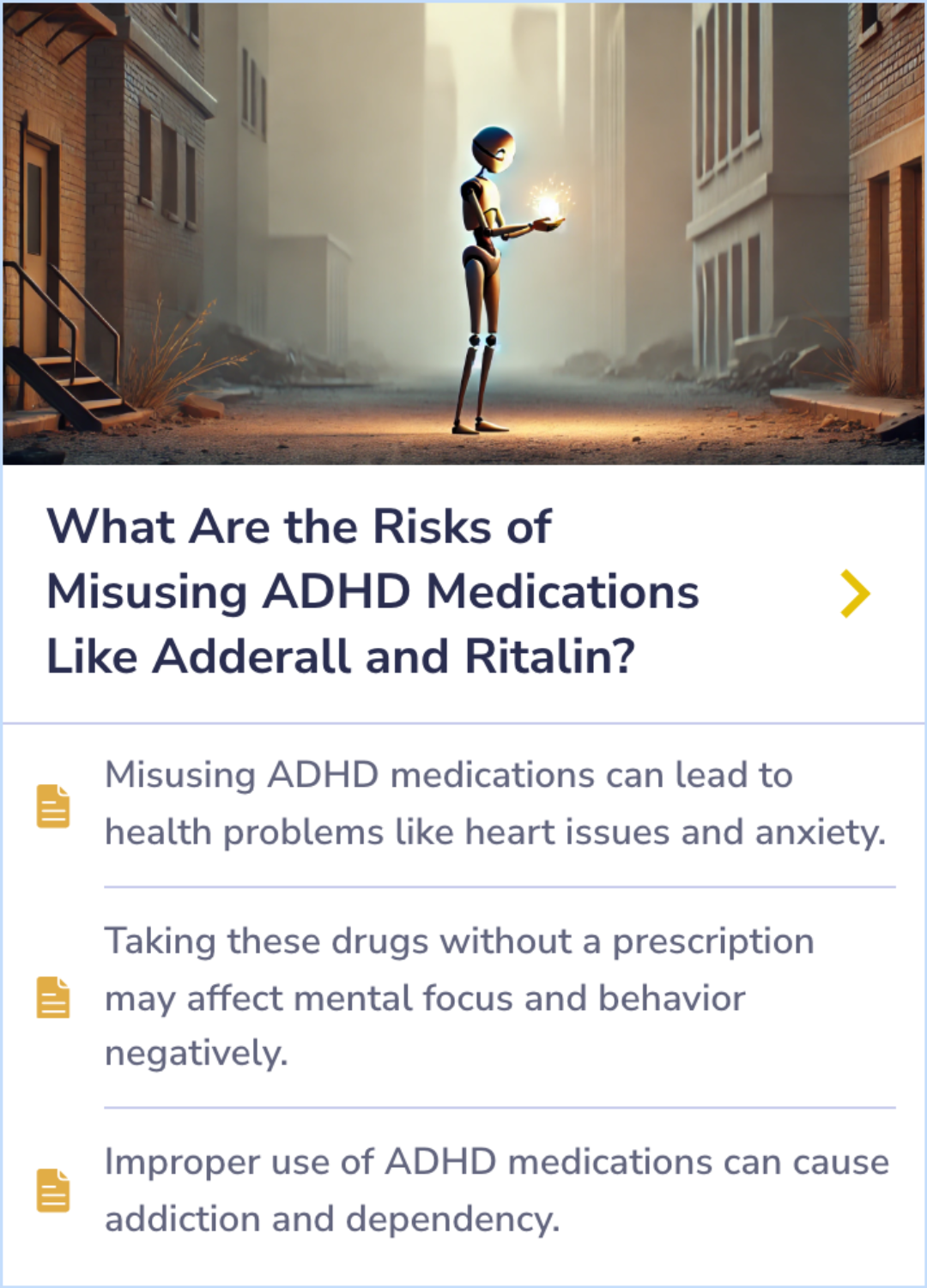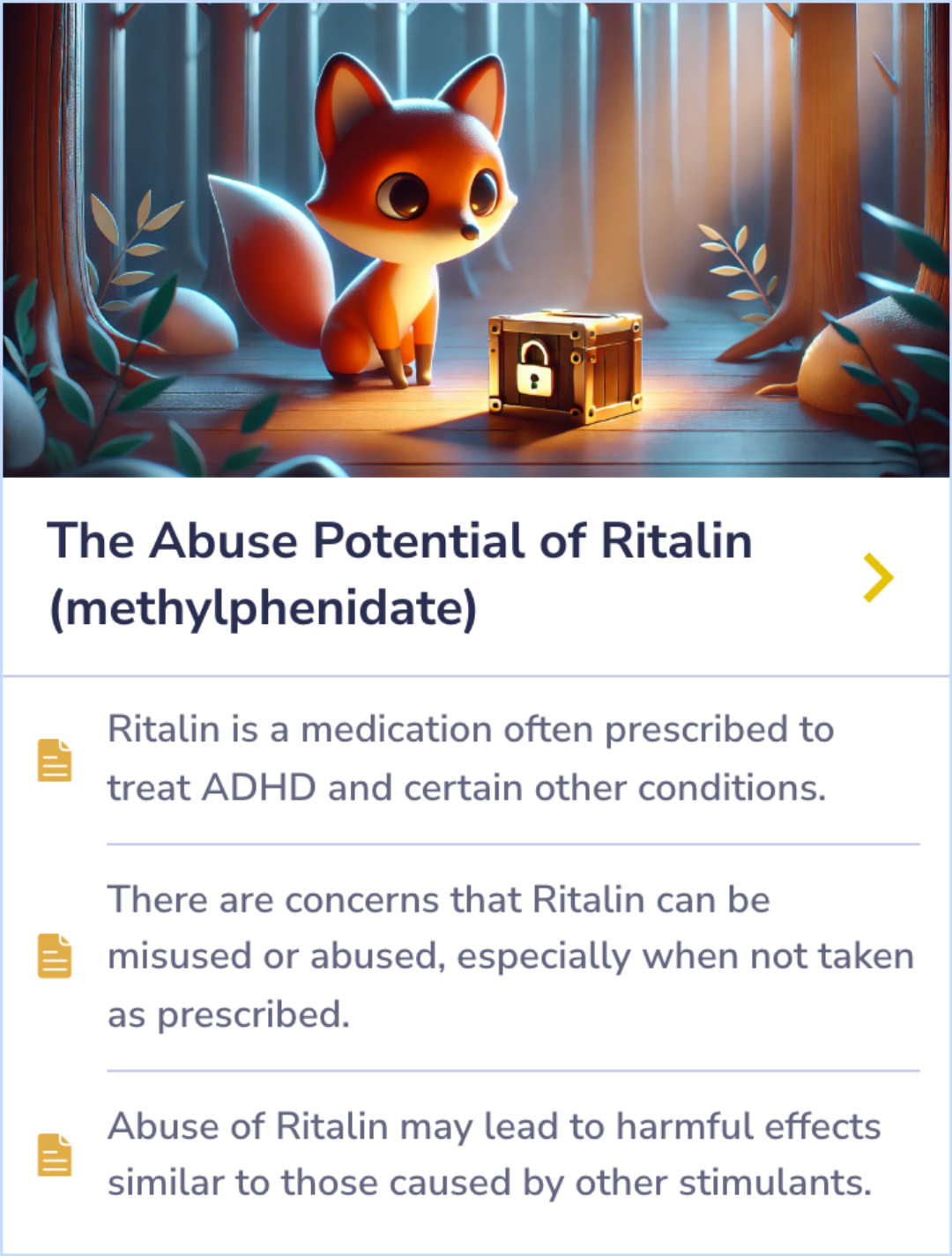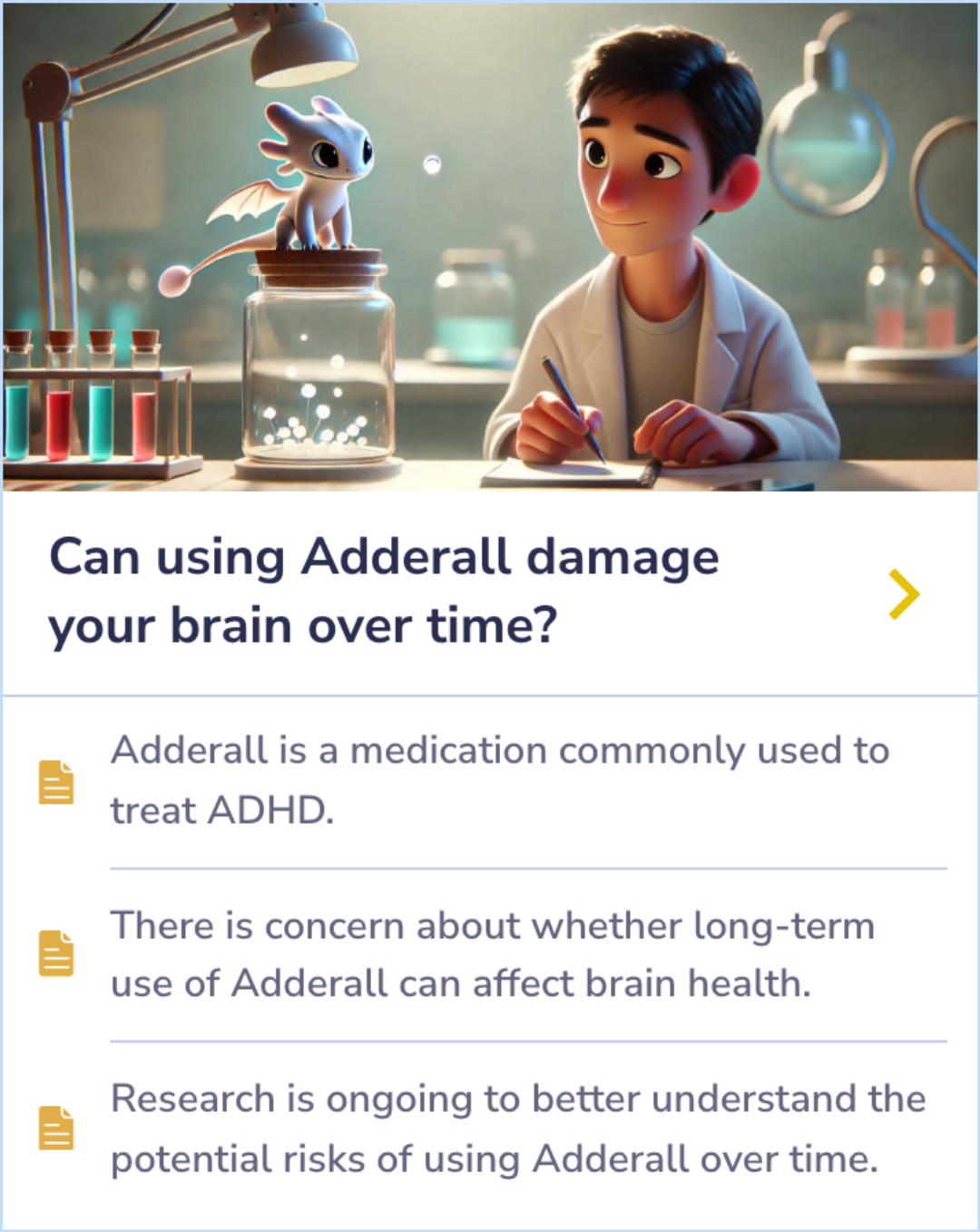Adderall
Evidence Based Answers
What Are the Risks of Developing Amphetamine-Induced Psychosis?
Amphetamine-induced psychosis can develop even at standard doses, triggered by changes in brain chemistry. Key symptoms include hallucinations and agitation, with higher risk in certain individuals.
Published: October 24, 2024
Click to explore a section:
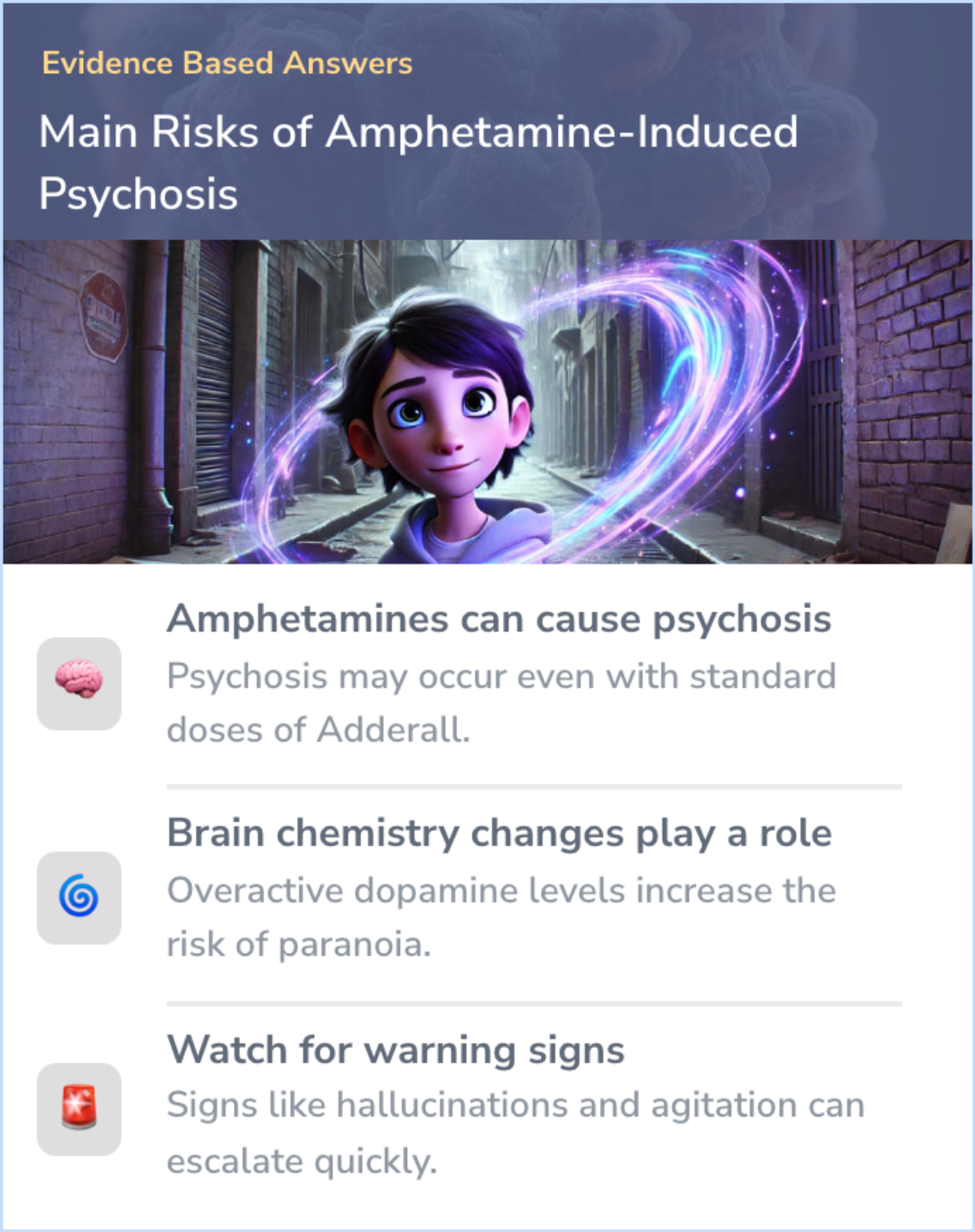
Amphetamine use may cause psychosis, linked to brain changes like dopamine overactivity, with warning signs such as hallucinations and agitation.
Studies Summary
🔍
Connection Between Amphetamine Use and Psychosis
A systematic review highlights that there is a strong link between amphetamine use and the risk of developing psychosis. The likelihood increases substantially with amphetamine use disorder, reflecting significant mental health risks.
⚠️
Risks and Symptoms of Amphetamine-Induced Psychosis
Amphetamine-induced psychosis can appear even at normal doses of medications like Adderall. It can cause severe mental health symptoms such as hallucinations and delusions, which may resemble schizophrenia.
🧠
Biological and Risk Factors
Psychosis from amphetamines is associated with overactive brain chemicals, especially dopamine. People with prior mental health conditions are at a greater risk of experiencing symptoms like paranoia and hallucinations.
Highly Cited Studies
Long term Effects of Methylphenidate in Adults
Peer Reviewed Study 1
Association Between Amphetamine Use and Risk of Psychosis
Peer Reviewed Study 2
Elevated Mortality Risks Linked to Amphetamine Use
Peer Reviewed Study 3
No Increased Risk of Substance Abuse with ADHD Medications
Background: Understanding Amphetamine-Induced Psychosis
Amphetamine-induced psychosis is a serious mental health condition that can emerge even at recommended doses of stimulants like Adderall. Symptoms may include hallucinations, delusional thinking, and manic behavior. These symptoms can mimic schizophrenia, making early detection and management crucial.
The risk of developing psychosis increases if there is a history of psychiatric disorders or if the medication is misused, highlighting the importance of careful monitoring by healthcare providers.
The risk of developing psychosis increases if there is a history of psychiatric disorders or if the medication is misused, highlighting the importance of careful monitoring by healthcare providers.
“
Source Quotes:
Treatment emergent psychotic or manic symptoms, e.g., hallucinations, delusional thinking, or mania in children and adolescents without prior history of psychotic illness or mania can be caused by stimulants at usual doses.
Dextroamphetamine and methamphetamine have a higher affinity for DAT, and intoxication can cause psychiatric disturbances resembling a manic episode or an acute psychotic break.
Background: Biological Mechanisms and Risk Factors
The onset of amphetamine-induced psychosis is linked to specific changes in brain chemistry, particularly the overactivation of neurotransmitters like dopamine. This overactivity can lead to symptoms such as paranoia and hallucinations. Certain individuals, especially those with a history of psychiatric disorders, are at a higher risk.
Understanding these mechanisms and risk factors is crucial for safe prescribing and for patients to be aware of potential dangers, especially in cases of misuse or high dosage.
Understanding these mechanisms and risk factors is crucial for safe prescribing and for patients to be aware of potential dangers, especially in cases of misuse or high dosage.
“
Source Quotes:
The main mechanism of action of AMP is to increase synaptic extracellular DA and NE levels. This effect is mediated by inhibition of DA transporters (DAT) and NE transporters (NET), which reduces the reuptake of these molecules from the synapse.
Psychosis has been reported in individuals who misuse or take excessive amounts of stimulant medication and may be an indication that a stimulant is being misused.
Background: Symptoms and Warning Signs
Recognizing the symptoms of amphetamine-induced psychosis is critical for timely intervention. Common signs include hallucinations, paranoia, and severe agitation. These symptoms can escalate quickly, particularly in individuals using high doses or with pre-existing mental health conditions.
If you or someone you know experiences these symptoms while taking amphetamines, it is essential to seek medical attention immediately to prevent further complications.
If you or someone you know experiences these symptoms while taking amphetamines, it is essential to seek medical attention immediately to prevent further complications.
“
Source Quotes:
Common signs and symptoms of acute amphetamine intoxication include hypertension, tachycardia, tachypnea, hyperthermia, mydriasis, tremors, agitation, and psychosis.
High doses of amphetamines can produce psychotic behavior indistinguishable from schizophrenia in asymptomatic schizophrenics and in some healthy human subjects.
Background: Management and Prevention of Psychosis
Managing amphetamine-induced psychosis typically involves discontinuing the stimulant and, in some cases, using medications like antipsychotics to control symptoms. Prevention is key, which includes using the lowest effective dose and monitoring patients closely for early signs of psychosis.
Patients and providers should work together to balance the therapeutic benefits of amphetamines with the potential risks, particularly in those with a history of mental health issues.
Patients and providers should work together to balance the therapeutic benefits of amphetamines with the potential risks, particularly in those with a history of mental health issues.
“
Source Quotes:
Management of amphetamine intoxication generally involves the use of benzodiazepines and antipsychotics to control agitation and psychotic symptoms.
Optimising therapeutic efficacy whilst simultaneously maintaining side effects at an acceptable level is a difficult balance requiring careful dose titration in the patient.
Peer Reviewed Study
Study: Association Between Amphetamine Use and Risk of Psychosis
This systematic review and meta-analysis examined the association between amphetamine use and mental health outcomes, including psychosis. The findings show that any use of amphetamines is linked to higher odds of psychosis, with an odds ratio of 2.0. The risk increases significantly for those with an amphetamine use disorder, with an odds ratio of 3.0.
The data suggests a notable connection between amphetamine use and the likelihood of developing psychosis, highlighting the mental health risks associated with amphetamines.
The data suggests a notable connection between amphetamine use and the likelihood of developing psychosis, highlighting the mental health risks associated with amphetamines.
author
McKetin R, Leung J, Stockings E, Huo Y, Foulds J, Lappin JM, Cumming C, Arunogiri S, Young JT, Sara G, Farrell M, Degenhardt L
journal
EClinicalMedicine
Date Published
2019 Oct 17
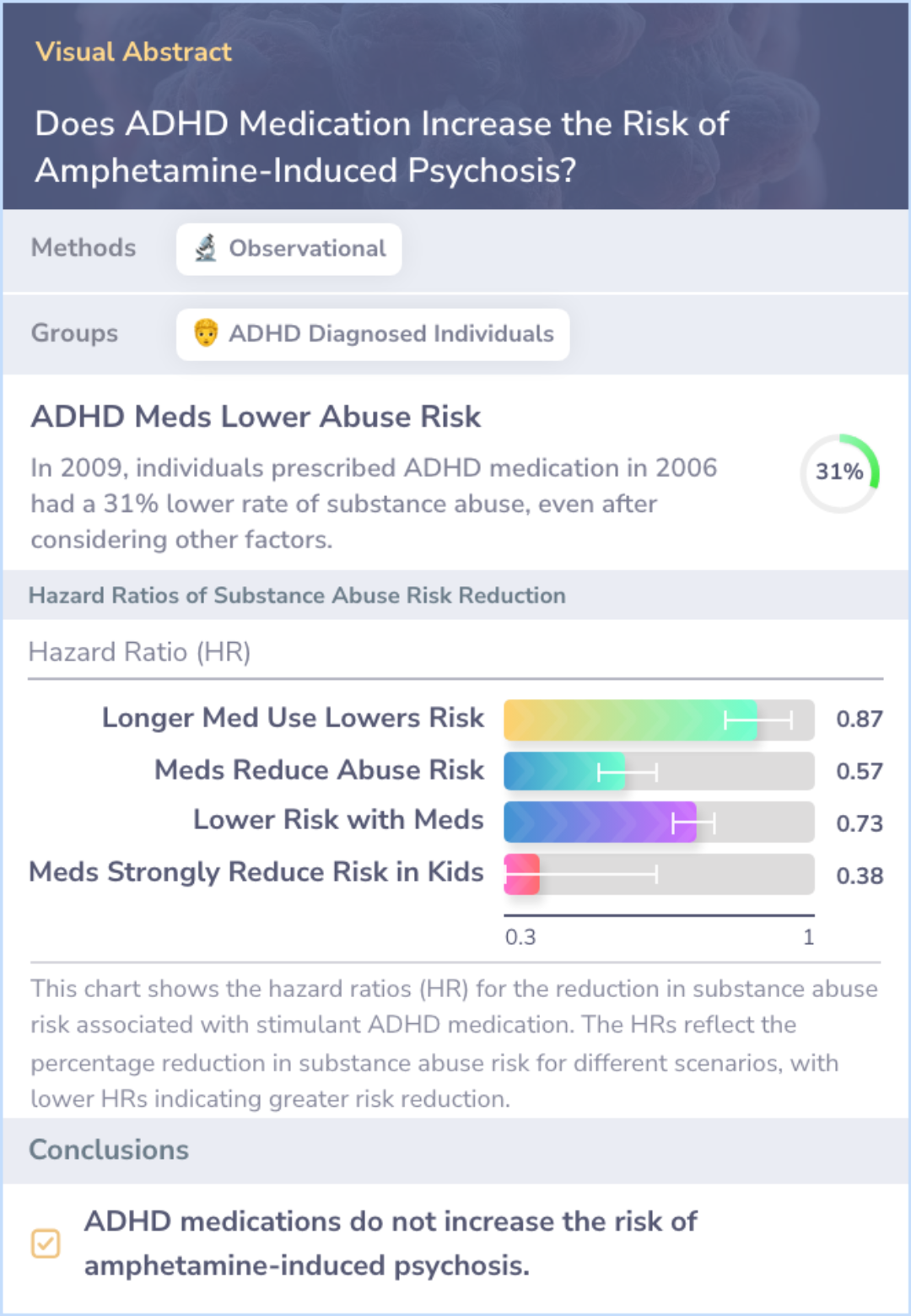
Peer Reviewed Study
Study: Elevated Mortality Risks Linked to Amphetamine Use
This abstract examines the mortality risks associated with regular or dependent amphetamine use, focusing on various causes of death. The study highlights that individuals with regular or dependent use of amphetamines have significantly higher rates of mortality compared to those without such use.
The causes of death examined include drug poisoning, cardiovascular disease, suicide, accidental injury, and homicide. The findings reveal high standardized mortality ratios (SMRs) for these causes, indicating an elevated risk.
The causes of death examined include drug poisoning, cardiovascular disease, suicide, accidental injury, and homicide. The findings reveal high standardized mortality ratios (SMRs) for these causes, indicating an elevated risk.
author
Stockings E, Tran LT, Santo T Jr, Peacock A, Larney S, Santomauro D, Farrell M, Degenhardt L
journal
Addiction
Date Published
2019 Oct

Peer Reviewed Study
Study: No Increased Risk of Substance Abuse with ADHD Medications
The study investigated whether stimulant ADHD medication is linked to an increased risk of substance abuse, which could include amphetamine-induced psychosis. Using data from Swedish national registers, researchers examined individuals diagnosed with ADHD and their use of stimulant medication. The results showed that ADHD medication was not associated with a higher risk of substance abuse. In fact, the risk was 31% lower for those who used ADHD medication, suggesting a protective effect.
This data implies that stimulant ADHD medications do not increase the risk of substance abuse or related complications, such as amphetamine-induced psychosis. Clinicians should still monitor for misuse and diversion.
This data implies that stimulant ADHD medications do not increase the risk of substance abuse or related complications, such as amphetamine-induced psychosis. Clinicians should still monitor for misuse and diversion.
author
Chang Z, Lichtenstein P, Halldner L, D'Onofrio B, Serlachius E, Fazel S, Långström N, Larsson H
journal
J Child Psychol Psychiatry
Date Published
2014 Aug

Key Takeaways
Conclusions
Research establishes a notable correlation between amphetamine use and an elevated risk of developing psychosis. Amphetamines can trigger hallucinations and paranoia due to changes in brain chemistry, particularly with dopamine.
Elevated mortality risks further highlight the dangers, emphasizing the need for cautious prescription and monitoring. ADHD medications, however, show a protective effect against substance abuse.
Elevated mortality risks further highlight the dangers, emphasizing the need for cautious prescription and monitoring. ADHD medications, however, show a protective effect against substance abuse.

Evidence Summary
Health Risks of Misusing ADHD Medications
Misusing ADHD medications like Adderall and Ritalin can lead to significant health issues. Beyond potential heart problems and anxiety, these drugs may negatively impact focus and behavior when taken without a prescription.
Addiction and dependency are risks of improper use, highlighting the importance of following medical advice and prescriptions closely.
Addiction and dependency are risks of improper use, highlighting the importance of following medical advice and prescriptions closely.
Evidence Summary
Potential Risks of Ritalin Misuse
While Ritalin is primarily prescribed for ADHD and other conditions, its misuse can be dangerous. If not taken as prescribed, this stimulant may lead to harmful effects, resembling issues seen with other stimulants. Concerns about potential misuse underline the necessity for responsible use. Monitoring and adherence to dosage are essential in minimizing abuse risk and ensuring its safe, intended effects.
Evidence Summary
Potential Brain Health Risks with Long-Term Adderall Use
Long-term use of Adderall, a common ADHD medication, raises concerns about its effects on brain health. Current research is ongoing to determine whether extended usage could pose potential risks.
As scientists continue to investigate, the importance of monitoring and understanding these potential risks remains at the forefront of discussions about Adderall's safety over time.
As scientists continue to investigate, the importance of monitoring and understanding these potential risks remains at the forefront of discussions about Adderall's safety over time.
